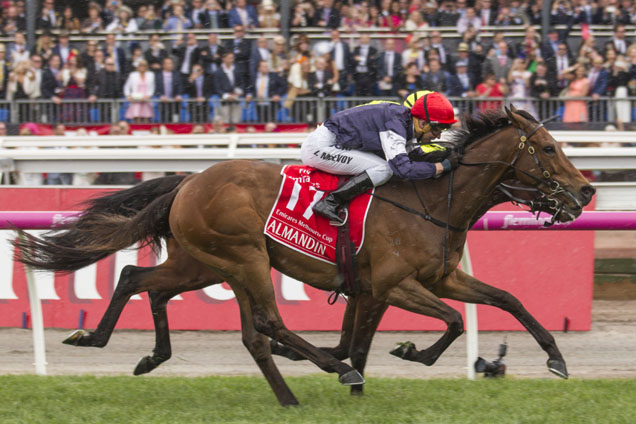3 minute read
German-bred thoroughbreds have stormed through the world’s most glamorous races with an unrelenting display of class, stamina and durability.
SInce the resolute Paolini and his determined dead-heat victory in the Dubai Duty Free during a globe-circling campaign of 22 consecutive G1 races in eight countries, their ranks have swelled to encompass the 2016 and 2014 Melbourne Cup winners Almandin and Protectionist; Prix de l’Arc de Triomphe heroine Danedream and Breeders’ Cup Turf victor Shirocco.

Contributing further lustrous feats have been Manduro, who repelled English and Irish Derby winners in the Prince of Wales’s Stakes en route to the crown as the world’s highest-ranked racehorse of his era; Prix du Jockey Club conqueror Intello; Prix Ganay champion Pastorius; US G1 winner Sabiango, and French and Australian G1 winner Seville.
Further embellishing their global gravitas was Dalicia, a Group performer whose first foal, Animal Kingdom, glided across all surfaces and captured the Kentucky Derby and the Dubai World Cup.Another mare, Moonlady, a classic winner in her own right, delivered Eishin Flash, winner of the Tokyo Yushun (Japanese Derby) with a devastating turn of foot.
Undeniably, German-bred racehorses — alongside others trained in Germany, such as record-smashing King George VI and Queen Elizabeth winner Novellist — have made a big mark in recent years through elite competition around the world.What makes their accomplishments most remarkable is that they have emerged from a country that produces no more than about 850 foals a year, and one in which racing has had to battle to preserve its position in a landscape where sports betting and soccer are pre-eminent.
While much of the rest of the world puts priority on speed, shorter races and precocity, German breeders and owners prefer to focus on producing thoroughbreds that will prevail over longer tests and are sound enough to remain competitive for years.In large measure, that is the reason for their success.
“The Germans concentrate on one thing, basically — staying races,” observed Daniel Krüger, manager of the German Owners and Breeders Association (Besitzervereinigung).He is also a key executive for both German Thoroughbred Marketing and Gestut Fahrhof, the breeder of many top runners including Sabiango and Arlington Million winner Silvano, a champion sire in South Africa.
“From seven Group 1 races in Germany there are five over 12 furlongs; the German Oaks is over 11 furlongs and there is only one over 10 furlongs,” noted Krüger.“So that shows where our attention goes - to the classic, staying horse.
“And that is what Germans want to breed. We also give them time as two-year-olds — we don’t push them or run them too soon — and those are the main reasons I would say Germany is so successful.There are only about 525 active breeders in Germany, and most of have only a few horses.
“Seventy-five percent of our breeders in Germany have only one or two mares. That means they put a lot of hard work, patience and passion into breeding - into the nomination, into the stallion selection, into the mare, into raising the foal,” Krüger said.“A lot of Germans, even if they try to be commercial from their head, in their hearts, they are still owner-breeders.
“If they don’t sell, they keep the horse and they send it to their traditional trainer.”Their insistence on this kind of personal involvement, as well as not pushing juveniles to race early or often, is part of their secret.
“That’s why their horses are so good, long term,” Krüger said.“Germany has a very small population of horses,” said Andreas Jacobs of leading stud farm Gestut Fahrhof, pointing out the significance in the nation’s racing of long-standing stud farms that have been dedicated to developing female families for generations.
“We are an owner-breeder country, we are not a commercial country. We’ve become a bit more commercial, but essentially the strength is coming from the owner-breeders.“There are families like those at the Schlenderhan stud - they have families where they have 20 generations of breeding, which is hugely impressive.”
Gestut Schlenderhan was founded in 1869 and has been in the Oppenheim family ever since.The farm not only stood Monsun but bred Allegretta, dam of Urban Sea and King’s Best, and granddam of Galileo and Sea The Stars.
The farm also bred the newest Melbourne Cup winner, Almandin, a gelding whose best performance in Germany was a G2 victory.Similarly, Jacobs and his family’s Gestut Fahrhof - albeit with a shorter history, having been founded in 1965 — have produced a bevy of landmark horses, including three-time Horse of the Year and four-time leading sire Acatenango and his six-time leading sire Surumu, as well as Horse of the Year Lomitas, sire of Danedream.
“The quality comes from the owner-breeders. The the backbone,” Jacobs said.“These big studs will always be there. They have been there 150 years and there is no reason they shouldn’t be there in the next 150 years.”
German breeders generally stick firmly with traditions, including what Krüger described as their resolve to ban any use of drugs and restrict from breeding premiums the offspring of any stallion that raced on medication.The deeds of Danedream, Protectionist, Novellist, Almandin and the others have propelled upward the bloodstock of Germany, as evidenced by the BBAG sale during Baden-Baden’s Great Week.
When the one-day auction ended, 185 yearlings had been sold for a total of €8,426,500, up 31 percent compared to the previous year’s results.Buyers included such globally known names as Markus Jooste of South Africa who buys under the banner of Mayfair Speculators, the Niarchos family, the Hong Kong Jockey Club and Australian Bloodstock.
A filly by Sea The Stars bred in Ireland by Germany’s Gestut Ebbesloh topped the sale on a bid of €500,000 from Jooste and his agents, Peter and Ross Doyle, who signed for eight yearlings, including a €110,000 Siyouni filly, which they bought in partnership with Gestut Fahrhof.Fahrhof also joined with the Niarchos family’s Flaxman Holdings in buying two colts by first-crop stallion Maxios, a multiple G1 winner in France carrying the Niarchos silks who now stands at Fahrhof.
Maxios, who led all the roughly 60 stallions standing in Germany this year by covering 110 mares, will try to carry on the legacy of his late sire Monsun, who was responsible for much of the rise of German racehorses through his internationally accomplished G1 performers Manduro, Novellist, Protectionist, Shirocco, Silasol, Stacelita, Almandin and 2013 Melbourne Cup winner Fiorente (bred in Ireland).“There is an international syndicate of English breeders, Irish breeders, and all the major German breeders and ourselves,” said Flaxman racing manager Alan Cooper of those who have invested in Maxios’s stud career.
Known for his quick acceleration and serene temperament, Maxios boasts a pedigree of the highest class, being a half brother to Prix de l’Arc de Triomphe winner Bago and a grandson of French champion Coup de Genie, dam of another champion in Denebola and a half sister to influential sire Machiavellian.His fifth dam is Natalma, globally pre-eminent as the producer of Northern Dancer.
Among established sires, Soldier Hollow, a multiple G1 winner by In The Wings from the female family of Nureyev and who ruled as Germany’s Horse of the Year in 2004, currently leads all others in Germany by progeny earnings.The resident of Gestut Park Wiedingen in northern Germany also topped BBAG sale sires by aggregate, with 23 yearlings sold for a total of €1.5 million.
Leading runners by Soldier Hollow include Australian G1 winner Our Ivanhowe, who while in Germany won the Grosser Preis von Baden; Prix Ganay and Deutsches Derby victor Pastorius, who, like Maxios, has his first crop of yearlings this year and stands at Fahrhof, and this year’s Henkel-Preis der Diana (German Oaks) winner Serienholde.So, even though German breeding and racing remains surprisingly small in numbers, the burgeoning quality that has emerged around the world is being honed to yield more glory in the years to come.







